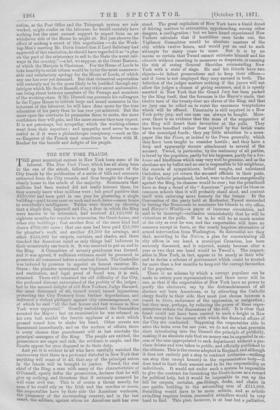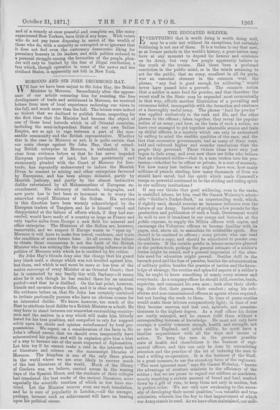THE NEW YORK FRAUDS.
THE groat municipal contest in New York loses none of its interest. The New Yorlc Times, which has all along been in the van of the attack, followed up its exposures of the City frauds by the publication of a series of bills and accounts extracted from the City records, and thus brought its charges clearly home to the minds of the majority. Statements that millions had been wasted did not really interest them, for they scarcely knew what millions were ; but proof positive that £250,000 had been paid in one year for plastering a single building—paid to one man on such and such dates—came home to everybody's intelligence. Tables were drawn up showing that a single firm, Ingersoll and Co., a firm in which the Ring were known to be interested, had received £1,140,000 in eighteen months for repairs to armouries, the Court-house, and other city buildings ; that another firm of the same kind had drawn £600,000 more ; that one man had been paid £51,000 for plumber's work; and another £8,300 for awnings, and other £134,000 for carpets, curtains, and shades, and these touched the American mind as only things half ludicrous in their monstrosity can touch it, It was resolved to put an end to the Ring. A Committee of seventy gentlemen was formed, and it was agreed, if sufficient evidence could be procured, to prosecute all concerned before a criminal Court. The Controller was induced by pressure to appoint an honest receiver, Mr. Green ; the plumber mentioned was frightened into confession and restitution, and legal proof of fraud was, it is said, obtained. There still remained the old difficulty of the City, the profound distrust entertained of the probity of the judges ; but to the amazed delight of old Now Yorkers, Judge Barnard, the most distrusted of all, turned round, issued injunctions protecting the City Treasury from further depredations, and delivered a violent philippic against city mismanagement, out of which he said " all the fast horses and fast women in New York wore supported." Greatly emboldened, the Committee arrested the Mayor ; but on examination he was released on his own bail, amidst the frantic applause of a mob which pressed round him to shake his hand. Other arrests are threatened immediately, and on the surface of affairs, there is every chance that punishment will at last overtake the principal managers of the Ring. The people are excited, the prosecutors are eager and rich, the evidence is ample, and the Courts appear for once disposed to do their duty. And yet it is evident to all who have carefully watched the controversy that there is a profound disbelief in New York that anything will come of it all, that any of the principal actors in the frauds will be brought to justice. Tweed, the real chief of the Ring, a man with many of the characteristics of O'Connell, openly defies the prosecutors, declares that he will give up nothing, and threatens that if seriously menaced he will raise civil war. This is of course a threat merely, for even if he could rely on the Irish and the rowdies en masse, the respectables have by their side the American workmen, the yeomanry of the surrounding country, and in the last resort, the soldiers, against whom no American mob has ever
stood. The great capitalists of New York have a timid dread of driving matters to extremities, apprehending, among other
dangers, a conflagration ; but we have heard experienced New Yorkers calculate that if hostilities once broke out, the Vigilance Committee would be absolute masters of the city within twelve hours, and would put an end to such attempts for many years to come. But it is by no means so certain that Tweed cannot extricate himself and his clientele without resorting to measures so desperate, or running the risk of seeing General Sheridan commanding New York with a state of siege. He and his friends have two objects—to defeat prosecutions and to keep their offices— and if force is not employed they may succeed in both. The defection of the judges matters nothing if the jurors will not allow the judges a chance of giving sentence, and it is openly asserted in New York that the Grand Jury has been packed by the Ring itself, that the foreman is the Mayor's uncle, that twelve men of the twenty-four are slaves of the Ring, and that no jury can be relied on to resist the enormous temptations which will be offered. Unanimity is still required in a New York petty jury, and one man can always be bought. More- over, there is no evidence that the mass of the supporters of the Ring will desert their favourites at the polls. They have been benefited rather than injured by the lavish waste of the municipal funds ; they pay little attention to a news- paper like the Times, or indeed to the Press generally, which they have been taught to consider hostile ; and they have a deep and apparently sincere attachment to several of the accused. Tweed, in particular, by the testimony of all parties, is loved by the populace, partly for his largesses, partly for a bon- homie and kindliness which may very well be genuine, and as the elections are by ballot and no one is responsible to his neighbour, the crowds of sympathizers, bribed roughs, and unlettered Catholics, may yet return the accused officials to their posts. If the Catholic priesthood, indeed, were to declare energetically against the Ring, its chances would be over ; but the priesthood have so deep a dread of the " American" party and its ideas on common schools that it will probably stand aloof, and content itself with enforcing more honesty for the future. In the Convention of the party held at Rochester, Tweed succeeded in forcing the Democrats to nominate his friends to city office, and Harper's Weekly—a paper of immense circulation, and said to be incorrupt—intimates unmistakably that he will be victorious at the polls. If he is, he will be as much master of the city as ever he was, and the respectables will have no resource except in force, or the nearly hopeless alternative of armed intervention from Washington. So distrustful are they that, according to the Nation, a plan for concentrating all city offices in one hand, a municipal Cresarism, has been seriously discussed, and is rejected, mainly because after a year or two that one hand would be Tweed's. The respect- ables in New York, in fact, appear to be nearly at their wits' end to devise a scheme of government which could be trusted for more than a few months to keep out the corrupt favourites of the populace. There is no scheme by which a corrupt populace can be made to return pure representatives, and there never will be one, so that if the respectables of New York have no power to purify the electorate, say by the disfranchisement of all electors not born Americans, or by attracting the Catholic clergy finally to their side, they must just choose between a resort to force, endurance of the oppression, or emigration ; but they may, perhaps, by reducing the power of these repre- sentatives reduce the dimensions of the evil. It is clear that fraud could not have been carried to such a height in New York except for the secrecy with which the financial affairs of the City are conducted. Supposing the respectables able to seize the helm even for one year, we do not see what prevents their introducing into the Council the principle of publicity, making it an absolute rule that no money can be expended in ex- cess of the sum appropriated to each department without a pre- vious debate and vote taken in public, and officially published to the citizens.. This is the course adopted in England, and although it does not entirely put a stop to contract robberies—nothing can stop that except honesty in the representative body—it does tend to limit their amount and to fix the responsibility on individuals. It would not under such a system be impossible to give the contract for furnishing the Court-house as a reward for political help, but it would be impossible to run up the bill for carpets, curtains, gas-fittings, desks, and chairs in one public building to the astounding sum of £315,000. Swindling would have to be more artistic, and as artistic swindling requires brains, successful swindlers would be very hard to find. This plan, however, is at best but a palliative,
and of a remedy at once peaceful and complete we, like many experienced New Yorkers, have little if any hope. With voters who do not pay taxes disposing in secret of the wealth of those who do, with a majority so corrupted or so ignorant that it does not feel even the customary democratic liking for pecuniary honesty in its leaders, and with politics reduced to a personal struggle among the favourites of the people, plun- der will only be limited by the fear of illegal retribution, a fear which, though operative in some of the newer and less civilized States, is apparently not felt in New York.



































 Previous page
Previous page